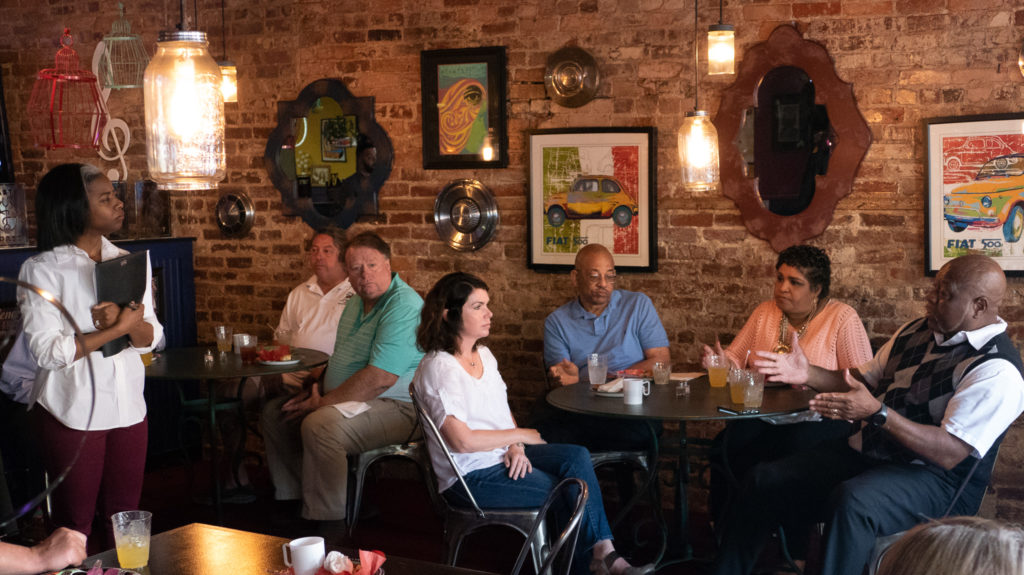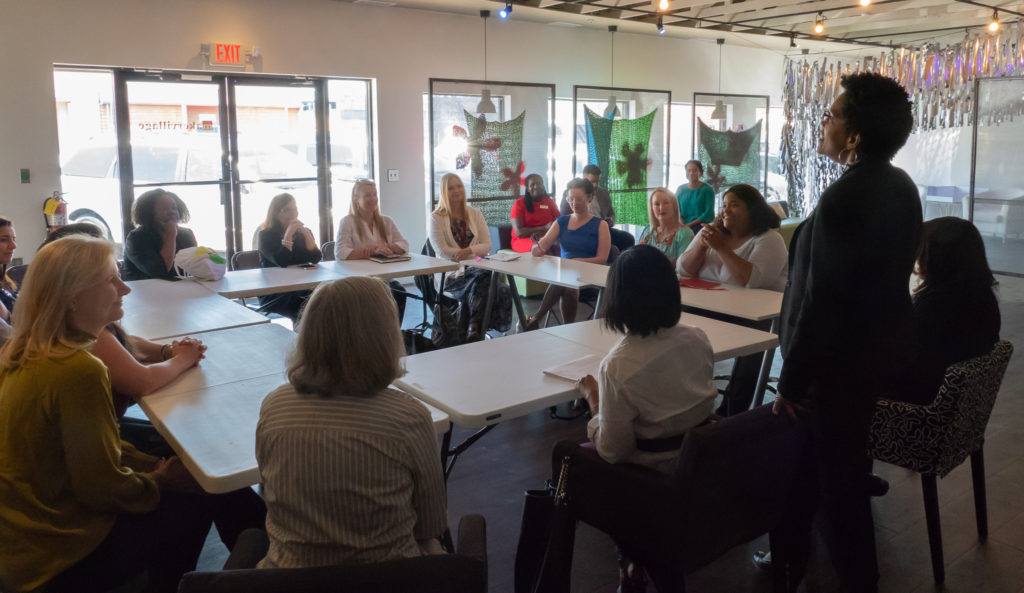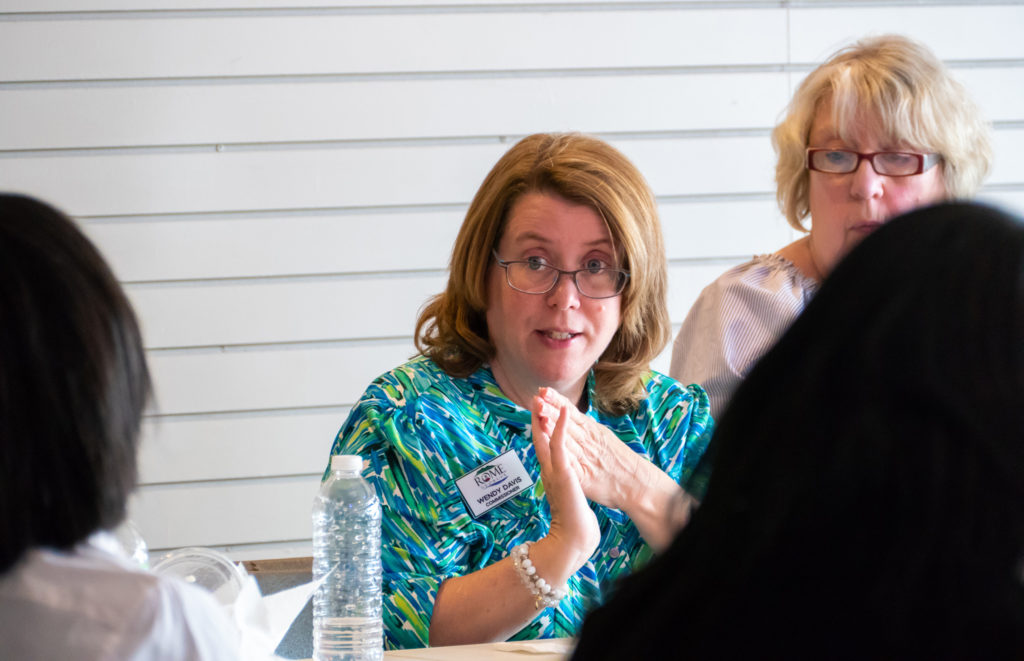On a beautiful spring morning in the northwest foothills of the Appalachian Mountains, a group of community leaders in Rome, Ga. gathered over breakfast, laughter and catch-up conversations. But as the morning meeting settled in, the friendly exchanges about neighbors and talk of the Rome Braves game tapered off.
A heavy and intense discussion ensued about how best to leverage the unique and valuable assets of the area to attract more residents and businesses, add jobs, provide a better education for school children and solve some of the region’s most pressing problems.
The people gathered at Jamwich on Broad Street that morning represented a broad swath of community leaders including school board members, city and county commissioners, business owners and chamber of commerce leaders. They seemed to share broad agreement on what is working and what needs fixing.
 View more photos from GBPI’s tour of Rome
View more photos from GBPI’s tour of Rome
It seems everyone agrees Rome needs a more skilled workforce.
But the consensus soon pivoted to differing ways on how to accomplish that goal. Ideas floated included devoting more attention to providing a quality education in the school system, partnerships between institutions of higher education and business, and how to address a palpable substance abuse crisis. Still, the big topic that permeated every single conversation throughout the entire day, including over breakfast with community leaders, was the need to address the mental health crises in the Northwest Georgia region, exacerbated by the 2011 closure of a major mental health facility, Northwest Georgia Regional Hospital.
The GBPI team visited Rome this month as part of a listening tour of the state that began in Albany in December and includes planned stops in Houston County and Athens. The tour is designed to gather community input across Georgia as GBPI builds on its people-first agenda.
The next stop in Rome for the GBPI team was the South Rome Early Learning Center, an innovative early childhood education program at the Anna K. Davie Elementary school in an economically disenfranchised area of the city. GBPI team members marveled at the quality-rated program that leverages the education department at nearby Berry College to develop curriculum and provide a teaching workforce. “A lot of these kids know too much about life,” said Teri Oberg, the program’s director. But you wouldn’t know it from the warm hugs, huge smiles and enthusiastic way the kids invited the GBPI visitors to watch them paint, do a puzzle or hunt for a baby turtle in the class terrarium.
“We are laser-focused on literacy,” said Jackie McDowell, the Dean of the Charter School of Education and Human Sciences at Berry College who helped developed the program.
The early learning center generates enthusiastic support from a unique coalition of community partners including the South Rome Redevelopment Corp., Rome city government, Rome City Schools, the Rome Rotary Club, the Seven Hills Rotary Club, Georgia Power, Berry College, Purpose Built Communities and local businesses and community members. But the program is at a crossroads – how best to expand on the model without compromising its approach? Based on the early success of this model, our team peppered the staff with questions: What could we learn and replicate? What would a statewide quality early learning program for all Georgia three-year-olds look like, and how can it happen?
Next stop, MakerVillage for a lunch of grilled cheese sandwiches from a local food truck. The GBPI team joined 20 bootstrapping women entrepreneurs. This co-work space near downtown Rome helps incubate small businesses in the area. The women talked about building their businesses and the opportunities and barriers they face in Rome such as more residents to create a larger customer base.
 While the conversation largely centered on the group’s collective love for the place nicknamed “The Enchanted Land,” many also recognized palpable unmet needs within the community. Once again, as was the thread in every conversation that day, access to mental health services was discussed along with homelessness and a more diverse teacher workforce to reflect the changing demographics of area schools.
While the conversation largely centered on the group’s collective love for the place nicknamed “The Enchanted Land,” many also recognized palpable unmet needs within the community. Once again, as was the thread in every conversation that day, access to mental health services was discussed along with homelessness and a more diverse teacher workforce to reflect the changing demographics of area schools.
A mid-afternoon stop at a local health clinic, Women of W.O.R.T.H., underscored the need for increased access to health insurance, especially as a tool to help their clients get needed physical and mental health care.
“Almost everyone we serve is employed,” said the clinic’s office manager, Kristen Sheeley. “Some can’t afford to pay because they need to save for child care or because rent is too high, or their wages are being garnished because of one unaffordable emergency room visit.”
Sheeley grew up in Rome. Her clinic serves about 1,000 clients annually. She expressed frustration over the need to drive patients more than an hour down to Atlanta to get the care they needed. She shared heartbreaking stories of two clients who died from conditions that could have been treated if only they had “the right kind of insurance.”
Sheeley wondered aloud, “If only the wealthy can access health care, what good is it as an asset for our community?”
Restoration Rome on the south side of town is a nonprofit dedicated to bringing together broken families with children in foster care. GBPI team members met with five resilient individuals who are overcoming enormous barriers to opportunity.
- A grandmother raising her daughter’s children while struggling with her own mental health problems.
- A mother working tirelessly to climb the ladder and secure benefits at work in order to regain custody of her children.
- A father working two jobs while living in a tent just to put some money in the bank to establish a basic level of financial security to regain custody of his children.
- A woman working to retire and own something of her own.
- A mother working to build a safe life thousands of miles away from home.
“Drugs are a killer around here,” said the grandmother who serves as her grandchildren’s full-time caregiver after her daughter’s bout with a substance abuse problem landed her in jail.
She talked about mental health needs and the damage substance abuse exacts on a family member, neighbor or the community.
Throughout the day, there were common threads and reflections sure to inform GBPI’s policy work including mental health, substance abuse, a skilled work force and a great education at all levels.
And Romans are working toward solutions. Romans are teachers who want a better future for their students. Romans are mothers and fathers, caregivers, neighbors and colleagues who open their home to people in need. And Romans are dedicated community leaders who are paving a way to a future where all roads lead to the children.
The City of Rome is beautiful. The picture-perfect revitalized downtown draws you in with its lovely storefronts, river walk and nod to the Rome of a by-gone era. The convergence of three rivers and rolling hills provide a fitting backdrop to the wafting smells of barbecue coming from a local restaurant. But the people are what make this city enchanted. Rome is blessed with a thoughtful group of community and business leaders, passionate residents, driven entrepreneurs and people from all walks of life who simply want to make a better life for their children.

“While there are many different points of view and discussions of the challenges we face, there is a through-line of the conversations that focus on our common desire for all of our neighbors to have successful lives full of opportunities for growth and happiness,” said Rome City Commissioner Wendy Davis. “This strong sense of community is what makes Rome a special place to live, work and play.”








